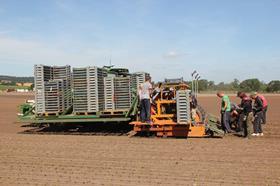
Less than a third of food industry labour providers have been able to supply all their clients' labour requirements in the last three months, alarming new research shows.
According to the Association of Labour Providers, of the 70 per cent of providers to the agriculture, food manufacturing and distribution sectors unable to meet all their clients' labour needs, 37 per cent were short by up to 10 per cent, 17 per cent by 10-20 per cent and 16 per cent by over 20 per cent.
Some 36 per cent of labour providers do not expect to be able to source and supply sufficient workers for theChristmaspeak.
The situation represents a significant decline on the same period a year ago, with 50 per cent of labour providersreporting thatlabour supplyisdown, 25 per cent reportingan increaseand 25 per cent no change.
Over three in five (61 per cent) state that the quality of workers is worse and only two per cent say that it is better.
There is also further evidence that the current tight labour supply is costing industry more money, with 56 per cent of providers reporting that their clients have had to increase wage rates to attract workers, and 77 per cent of providers having to invest more money and resources into sourcing workers, thereby increasing the cost of labour supply.
ALP chief executive David Camp said: “These resultsconfirmthat thewarning issued in theApril 2017Environmental, Food and Rural AffairsCommittee Report‘Feeding the nation: labour constraints’has come to pass in that ‘the current problem is in danger of becoming a crisis if urgent measures are not taken to fill the gaps in labour supply.’ No urgent measures have been taken, the crisis has arrived and what’s more, all the indicators are that 2018 will be worse.”
ALP has called on Defra to be a leader and a champion for the whole UK food supply chain and specifically for the Defra Access to Labour team towork with industry representatives in specialist multi-stakeholder groups.
It says this must result in the publication of official food supply chain skills and labour data, including temporary, seasonal and agency workers, in order that all parties are working from one agreed set of statistics and to inform the current work of the Migration Advisory Committee.
It also wants to see a model Seasonal Agricultural Workers’ Permit Based Quota Scheme designed and ready to be launched once the political button is pressed. And for every business in the food supply chain to be supported with practical measures to promote the UK and food sector and in sourcing and retaining a competent and reliable workforce.



